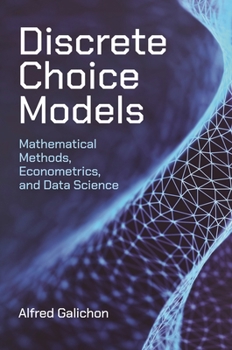Discrete Choice Models: Mathematical Methods, Econometrics, and Data Science
A foundational treatment of discrete choice models, with a focus on random utility models
Discrete choice models are essential tools for understanding decision-making when individuals must choose among alternatives. They have applications across the social sciences, notably in economics, marketing, and political science. This book offers a foundational treatment of discrete choice models, introducing the logit model and its generalizations, logistic and Poisson regressions, and generalized linear models, and demonstrates their use in analyzing important econometric models. These include international trade gravity, demand estimation, matching with and without transfers, hedonic markets, and dynamic discrete choice. Bridging theoretical clarity and practical applicability, the book is suitable for use in graduate-level coursework and will be an essential resource for researchers and practitioners. - Extensive coverage of computational issues, focusing on optimization and the reformulation as generalized linear models- Emphasis on econometric questions, including simulation, estimation, and inference methods, with estimation techniques based on both simulated and actual datasets
- A substantial set of exercises and problems at the end of each chapter
- Two appendixes, with one covering the mathematical tools needed to understand the material, and the other the Python code examples
Format:Hardcover
Language:English
ISBN:0691221804
ISBN13:9780691221809
Release Date:April 2026
Publisher:Princeton University Press
Length:376 Pages
Customer Reviews
0 rating





